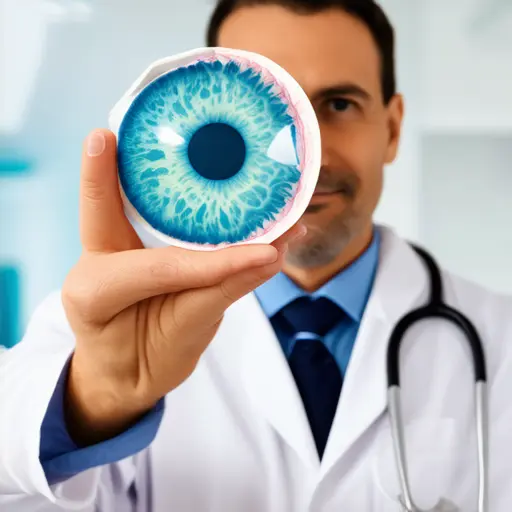A program so powerful, it’s designed to improve perfect eye health and give anyone who uses it crystal clear 20/20 vision in a matter of weeks.
Laser Surgery & More: Is There a Cure for Bad Eyesight?

Introduction: The Search for Clearer Vision—Is a Cure Possible?
If you've ever squinted at a menu in a dimly lit restaurant or struggled to read street signs while driving, you've probably wondered: "Is there a cure for bad eyesight?" You're not alone. Millions of people deal with blurry vision daily, whether from nearsightedness, farsightedness, or astigmatism. The good news? Today's vision correction options are more advanced than ever—and the future looks even brighter.
In this guide, we'll break down everything you need to know about fixing bad eyesight. From quick fixes like glasses to life-changing laser surgery and what’s on the horizon, we’ll help you navigate your options so you can see the world more clearly.
What Exactly Is "Bad Eyesight"?
Technically called refractive errors, bad eyesight happens when your eye’s shape bends light incorrectly, making things look fuzzy. The usual suspects include:
- Myopia (Nearsightedness): Road signs are blurry, but your phone is crystal clear.
- Hyperopia (Farsightedness): Reading a book feels like a workout for your eyes.
- Astigmatism: Everything looks slightly smudged, like a camera lens out of focus.
- Presbyopia: The dreaded "arm’s-length" struggle to read small print after 40.
Why Everyone’s Asking About a Cure
Let’s be honest—glasses can be a hassle (hello, fogged-up masks!), and contacts aren’t everyone’s cup of tea. People want freedom from corrective lenses, and while some treatments come close to a "cure," it depends on your eyes’ unique quirks.
Permanent Fix or Temporary Solution? What Actually Works
Glasses and contacts are like crutches for your eyes—they help but don’t heal. For lasting results, you’ll need to explore other routes. Here’s the scoop:
How Vision Correction Really Works
Think of your eye like a camera. If the lens (your cornea) is misshapen, the photo (your vision) turns out blurry. Treatments like LASIK tweak that lens, while implantable lenses add a new focusing mechanism inside your eye.
Do Glasses Count as a Cure?
Nope—they’re more like a quick edit rather than a full rewrite. But they’re still a safe, affordable option for millions. (Plus, they’re a great accessory!)
Do THIS 7-Second Trick Tonight, Restore Perfect 20/20 Vision Tomorrow

VisiSoothe - Vision Breakthrough
Learn moreLASIK: The Rockstar of Vision Correction
LASIK is the go-to for ditching glasses, with a 15-minute procedure and next-day results. But is it right for you?
LASIK Explained (Without the Jargon)
A laser gently reshapes your cornea—like smoothing out a dent in a camera lens. Most people see clearly by the next morning, though some deal with temporary dry eyes or nighttime glare.
PRK: The Underrated Alternative
If your corneas are too thin for LASIK, PRK might be your match. It’s like LASIK’s older sibling—slightly tougher recovery but equally effective long-term.
Is Laser Surgery Worth the Risk?
With a 96% success rate, complications are rare but possible. An experienced surgeon can tell you if your eyes are a good fit.
No LASIK? No Problem. Other Ways to Fix Your Vision
Not everyone qualifies for laser surgery, but there are still great options:
ICL: The "Invisible Glasses" Implant
Think of it as a tiny, permanent contact lens placed inside your eye—ideal for severe nearsightedness.
Corneal Cross-Linking: For Weak Corneas
This UV light treatment strengthens corneas, stopping conditions like keratoconus from worsening.
The Natural Ultra Absorbable Dropper That Supports Strong Vision

Inside every drop of "EyeFortin" you'll find: A perfectly dosed proprietary blend of selected plants and minerals, carefully mixed to complement one another into a powerful vision supporting formula.
Try this at homeOrtho-K: Overnight Vision Correction
Special contacts worn while you sleep gently reshape your cornea, giving you glasses-free days.
Can You Improve Your Eyesight Naturally?
While you can’t exercise or eat your way to 20/20 vision, these habits help keep your eyes healthy:
Eat Like Your Eyes Depend on It (Because They Do)
Load up on leafy greens, fatty fish, and colorful veggies—they’re packed with vision-friendly nutrients.
Eye Exercises: Helpful or Hype?
The 20-20-20 rule (look 20 feet away every 20 minutes) eases strain but won’t fix prescriptions.
Screen Time Survival Tips
Blue light filters and regular breaks can save your eyes from digital exhaustion.
The Future of Vision Correction: What’s Coming Next
Science fiction is becoming reality with these cutting-edge developments:
Gene Therapy: Fixing Vision at the Source
Researchers are editing genes to prevent inherited eye diseases—think of it as a software update for your DNA.
Bionic Eyes: Beyond Glasses and Contacts
Retinal implants already help some blind patients see light and shapes, with more advances on the way.
Custom Laser Treatments
New tech maps your eye’s unique imperfections for hyper-personalized corrections.
Setting Realistic Expectations
While we’ve made huge strides, some conditions still can’t be fully reversed:
When a Full Cure Isn’t Possible Yet
Diseases like glaucoma or macular degeneration can be managed but not yet cured.
Aging and Your Eyes
Presbyopia and cataracts are part of getting older, but treatments like cataract surgery work wonders.
Why Check-Ups Matter
Regular eye exams catch problems early and keep your correction up-to-date.
Wrapping Up: Your Path to Clearer Vision
So, is there a cure for bad eyesight? For many people, today’s treatments come incredibly close. Whether you choose LASIK, ICL, or stick with glasses, the key is finding what works for your eyes and lifestyle.
Quick Recap
- LASIK/PRK: Great for most refractive errors if you’re a candidate.
- ICL/Ortho-K: Solid alternatives when LASIK isn’t an option.
- Healthy habits support eyes but won’t replace prescriptions.
- The future holds exciting possibilities—from gene therapy to bionic vision.
Your Next Step
Ready to explore your options? Book a consultation with an eye specialist. With the right approach, you could be seeing life in HD before you know it!










